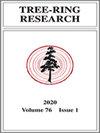CLIMATE-GROWTH RESPONSES FROM PINUS PONDEROSA TREES USING MULTIPLE MEASURES OF ANNUAL RADIAL GROWTH
IF 1.1
4区 农林科学
Q3 FORESTRY
引用次数: 1
Abstract
ABSTRACT When using old-growth trees from semiarid, open-canopy environments, basal area increment (BAI), an absolute measure of radial growth, is sometimes used instead of the more commonly used ‘conservative techniques’ (negative exponential or linear regression with a negative slope; NegX) because narrow rings have been shown to potentially bias results. In this study we explore the relationship between radial growth of ponderosa pine from four study sites in Montana and climate (temperature, precipitation, drought severity) using unstandardized raw ring width and BAI values, and standardized values generated via Friedman Super Smoother and NegX. All sites are minimally disturbed, and our selection criteria are limited to older (interior dates pre-A.D. 1850 at breast height) trees growing in open-canopy environments free of visible disturbance such as lightning strikes. We found the strongest relationships (r > 0.60) for radial growth with July and prior-year October Palmer Drought Severity Index values. Our results show that radial growth-climate responses generally fall within a narrow range regardless of the representation of annual growth (e.g. for July temperature r-values are largely –0.3 to – 0.4) and that site conditions determine which radial-growth values (i.e. unstandardized or standardized) optimize climate-growth responses.利用多种径向年生长指标研究黄松的气候生长反应
摘要:当使用来自半干旱、开放树冠环境的老树时,有时会使用基底面积增量(BAI),一种径向生长的绝对测量方法,而不是更常用的“保守技术”(负指数或负斜率线性回归;NegX),因为窄环已被证明可能会对结果产生偏差。在本研究中,我们使用未标准化的原始环宽和BAI值,以及通过Friedman Super Smoother和NegX生成的标准化值,探讨了蒙大拿州四个研究地点黄松的径向生长与气候(温度、降水、干旱严重程度)之间的关系。所有地点都受到了最小的干扰,我们的选择标准仅限于生长在没有可见干扰(如雷击)的开放式树冠环境中的较老(内部日期在公元1850年之前,齐胸高)树木。我们发现径向生长与7月和前一年10月的Palmer干旱严重性指数值之间的关系最强(r>0.60)。我们的研究结果表明,无论年增长的代表性如何,径向增长气候响应通常都在一个狭窄的范围内(例如,7月份的温度r值主要为-0.3至-0.4),而场地条件决定了哪些径向增长值(即非标准化或标准化)优化了气候增长响应。
本文章由计算机程序翻译,如有差异,请以英文原文为准。
求助全文
约1分钟内获得全文
求助全文
来源期刊

Tree-Ring Research
农林科学-林学
CiteScore
2.40
自引率
12.50%
发文量
15
审稿时长
>36 weeks
期刊介绍:
Tree-Ring Research (TRR) is devoted to papers dealing with the growth rings of trees and the applications of tree-ring research in a wide variety of fields, including but not limited to archaeology, geology, ecology, hydrology, climatology, forestry, and botany. Papers involving research results, new techniques of data acquisition or analysis, and regional or subject-oriented reviews or syntheses are considered for publication.
Scientific papers usually fall into two main categories. Articles should not exceed 5000 words, or approximately 20 double-spaced typewritten pages, including tables, references, and an abstract of 200 words or fewer. All manuscripts submitted as Articles are reviewed by at least two referees. Research Reports, which are usually reviewed by at least one outside referee, should not exceed 1500 words or include more than two figures. Research Reports address technical developments, describe well-documented but preliminary research results, or present findings for which the Article format is not appropriate. Book or monograph Reviews of 500 words or less are also considered. Other categories of papers are occasionally published. All papers are published only in English. Abstracts of the Articles or Reports may be printed in other languages if supplied by the author(s) with English translations.
 求助内容:
求助内容: 应助结果提醒方式:
应助结果提醒方式:


